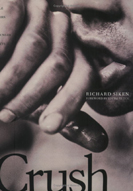|
Crush as in Desire
Review by Tryst Editor
In the foreword, Louise Glück wrote,
"This is a book about panic. The word is never mentioned.
Nor is the condition analyzed or described — the speaker
is never outside it long enough to differentiate panic from
other states. . . If panic is his ground note, Siken's obsessive
focus is a tryant, the body."
Let's make this really simple, I don't agree
with the foreword. Especially when Glück compares her
reaction to Siken's work with that of Dickinson's too-oft
quoted and ridiculous litmus of what is a poem, "If
I feel physically as if the top of my head were taken
off, I know that is poetry." Could we be a little
more original? I find these kind of all-encompassing blurbs,
forewords (though well-intentioned) suspect and not the
least of, too definitive. For one thing, when one writes, "This is a
book about panic" it often sets the tone for how
the reader will interpret the work by the very power of
suggestion. Two words, "panic" and "obsessive" are
bandied around as if they were natural companions occupying
the same couch and do not do justice to the depth of Siken's
work. Panic by definition suggests, "A sudden, overpowering
terror" — and it makes me wonder if this is
more of the reader's reaction to the work, than in the
words themselves. If there is terror implied, it's never
revealed in the structure of the writing, which in itself
is very physical. The lines themselves are jagged, not
left-flushed or justified in all but four of the poems.
Without the benefit of citing the entire book here, (as
much as I would like to), the structure is important
as to how the poems are to be read. The jaggedness affords
a certain wildness of expression, untamed and loosened
from the confines of ordinary, "neatly-lined" linebreaks—ordinary
linebreaks that often avail themselves to convenience
and creatures of habit. But what I sense in Crush is
a love of danger and submission, sexual energy and abandonment;
an homage, (not obsession), to embrace the physical,
carnality of the body. For example in Little Beast you
get the sense that the narrator is very comfortable
and knowledgeable of the body:
The
fact of his pulse,
the way he pulled his body in, out of shyness or shame or
a desire
not
to disturb the air around him.
Everyone could see the way his muscles worked,
the
way we look like animals,
his
skin barely keeping him inside.
The beauty of Siken's work is the way he
snakes his lines sinuously. They have a mesmerizing effect,
almost inducing a drugged somnolence in the reader while
the speaker ingests the poison/pain as in "A Primer
for the Small Weird Loves" not so much through admission
but through aloofness. In "Seaside Improvisations,"
you have agruments with the self: You wanted happiness,
I can't blame you for that/and maybe a mouth sounds idiotic
when it blathers on about joy/but tell me/you love this,
tell me you're not miserable. Who is this "you"
being addressed? Without a direct relationship to another
separate and indistinguishable voice, I can only infer that
"you" is the speaker, one and the same. "Like
Planets of Love" these poems speak to no one but to
the self, fully conscious of its own audience: Each act
carefully plotted out, the director visualizing his own
image in each scene. Think of the movie, "Urbania" by
Jon Shear and you get a dislocated sense of being outside
of the narration while participating in its emotions.
In the poem, "The Torn-Up Road" the speaker confesses,
"There's no way to make this story interesting. .
. I want to tell you this story without having to confess
anything," and yet it is a compelling piece of reverse
psychology. Then, there is this wonderful playfulness in "Boot
Theory":
A man walks into a bar and says:
Take my wife—please.
So you do.
Probably one of the more interesting poems was, "You Are Jeff" with
its hairpin lines, and hazardous excess; I held my breath
while reading it. At moments the poem felt as if it would
collide, turn on itself and self destruct but when it ended
on love, I sensed forgiveness and hope. I found this poem
the most interesting because, for lack of better words, it
was very strange: past and present selves meeting at an appointed
fate. Crush takes passion and risk to the extreme
and for this, Siken is to be lauded and applauded, loudly.
Copyright © 2005 Tryst3.com.
All Rights Reserved. |


